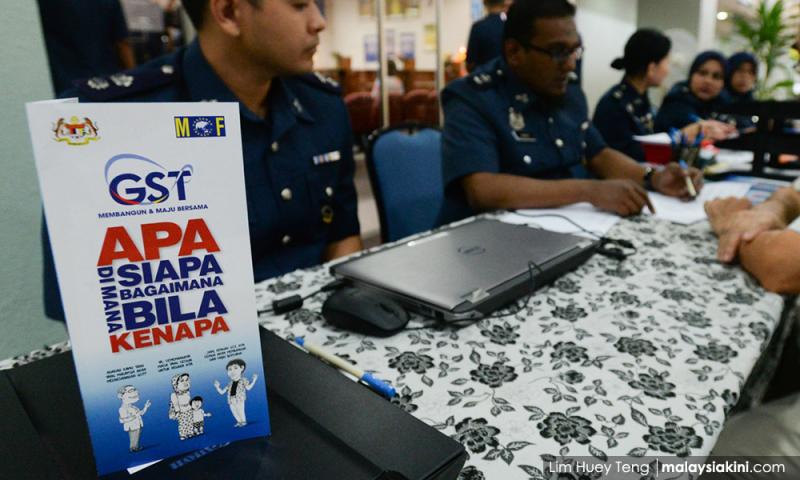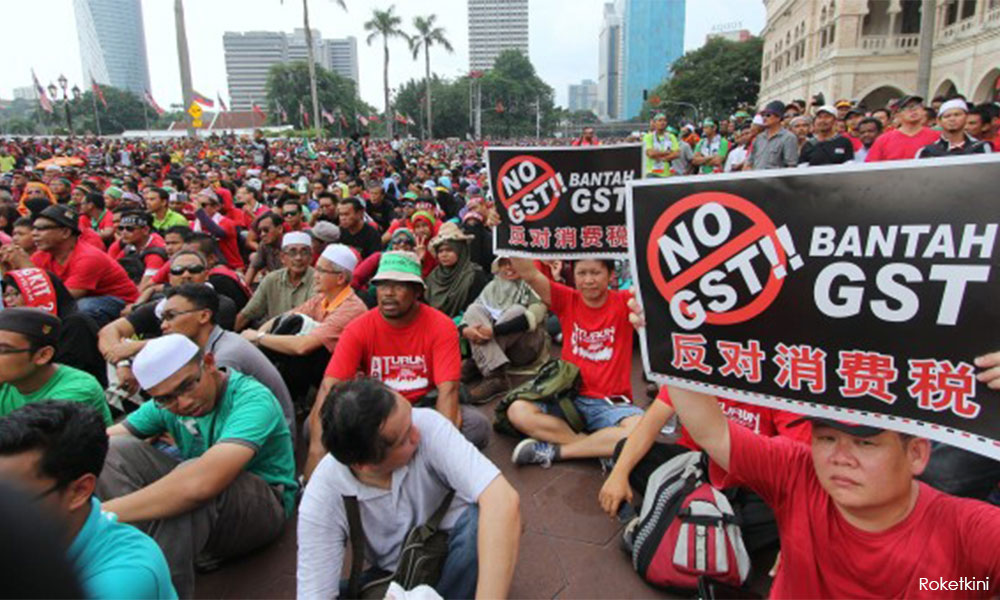
P Gunasegaram
COMMENT | There are two strong reasons why Prime Minister Anwar Ibrahim should reintroduce the Goods and Services Tax (GST) in the forthcoming budget this month – to fight corruption and help government finances.
But Anwar, who is also the finance minister, needs to pick up some courage and push back against political pressure.
GST was heavily politicised in the 2018 general election because of a handy confluence of convenience and lies, causing it to be prematurely killed after three years and a lot of hard work. More on that later.
The GST improves account keeping. The very act of getting refunds in the GST process ensures everyone keeps good accounts in the value chain. A close examination of these provides valuable clues to the real profits earned, thereby reducing tax evasion.
Tax evasion is one of the main corruption points in the country where many companies and individuals evade paying the full amount of tax by simply under-declaring their sales and profits.
When accounts have to be properly kept and disclosed such fraud is not easy to hide. It may be one of the reasons why GST was so slow to be introduced in Malaysia only to be demolished three years later, probably for the same reasons. Those who would evade taxes have, like many other corrupt persons, strong lobbying powers.
This very act of keeping good accounts can increase the amount of tax revenue generated without putting any additional burden on existing taxpayers who are paying their dues honestly.
It is entirely possible to tweak the GST through a system of lower tax rates than the current sales tax of six percent and exemptions so that current taxpayers and the poor are not burdened. The GST introduced in April 2015 had over 200 exemptions for essential goods.
Apart from good record keeping, the GST, which is a value-added tax or (VAT), has a number of key advantages which make it a better tax collection system. First, it widens tax coverage to consumption rather than just income.
That means it catches in its wider net those who earn a lot but don’t declare it by taxing consumption - those who consume more, pay more taxes. And second, yes, for reasons explained, it reduces evasion, thereby increasing tax collection.
Sales tax vs VAT
To fully understand the difference between a sales tax and a VAT, we should look at each in turn.
This article explains that sales tax is only collected by the retailer for passing on to the government when the final sale in the supply chain is reached. Therefore, until the sale is made to the last consumer, sales tax is not collected, and governments do not receive the tax revenue.
COMMENT | There are two strong reasons why Prime Minister Anwar Ibrahim should reintroduce the Goods and Services Tax (GST) in the forthcoming budget this month – to fight corruption and help government finances.
But Anwar, who is also the finance minister, needs to pick up some courage and push back against political pressure.
GST was heavily politicised in the 2018 general election because of a handy confluence of convenience and lies, causing it to be prematurely killed after three years and a lot of hard work. More on that later.
The GST improves account keeping. The very act of getting refunds in the GST process ensures everyone keeps good accounts in the value chain. A close examination of these provides valuable clues to the real profits earned, thereby reducing tax evasion.
Tax evasion is one of the main corruption points in the country where many companies and individuals evade paying the full amount of tax by simply under-declaring their sales and profits.
When accounts have to be properly kept and disclosed such fraud is not easy to hide. It may be one of the reasons why GST was so slow to be introduced in Malaysia only to be demolished three years later, probably for the same reasons. Those who would evade taxes have, like many other corrupt persons, strong lobbying powers.
This very act of keeping good accounts can increase the amount of tax revenue generated without putting any additional burden on existing taxpayers who are paying their dues honestly.
It is entirely possible to tweak the GST through a system of lower tax rates than the current sales tax of six percent and exemptions so that current taxpayers and the poor are not burdened. The GST introduced in April 2015 had over 200 exemptions for essential goods.
Apart from good record keeping, the GST, which is a value-added tax or (VAT), has a number of key advantages which make it a better tax collection system. First, it widens tax coverage to consumption rather than just income.
That means it catches in its wider net those who earn a lot but don’t declare it by taxing consumption - those who consume more, pay more taxes. And second, yes, for reasons explained, it reduces evasion, thereby increasing tax collection.
Sales tax vs VAT
To fully understand the difference between a sales tax and a VAT, we should look at each in turn.
This article explains that sales tax is only collected by the retailer for passing on to the government when the final sale in the supply chain is reached. Therefore, until the sale is made to the last consumer, sales tax is not collected, and governments do not receive the tax revenue.

VAT, on the other hand, is collected by all sellers in each stage of the supply chain. Suppliers, manufacturers, distributors and retailers all collect VAT on taxable sales. Similarly, suppliers, manufacturers, distributors, retailers and end consumers all pay VAT on their purchases.
Businesses must track and document the VAT they pay on purchases to receive a credit for the VAT paid on their tax return. Under a VAT regime, the government receives tax revenue throughout the entire supply chain, not just at the point of sale to the final consumer, the article explains.
That effectively means that there is a constant flow of tax revenue to the government and the chances of having tax lost altogether by not declaring sales to the final consumer is reduced because there is a process which can be traced back to see if there was indeed evasion.
Two points need to be noted in this argument - one taxes are increased by an impetus towards sales declaration through the VAT and two, this can be tweaked to ensure that there is really no increase in prices by adjusting downwards the quantum of the VAT (GST) and exemptions.
Because of these, the GST is a far more efficient system for indirect taxation (taxes other than those on income) than the sales tax can be because the latter is open to under-declaration and thus evasion, while it takes time for the tax collection which happens only upon sale and not at the points where value is added.
Possible political repercussions
That, in a nutshell, is why the GST should be implemented. However, in Malaysia, the lack of understanding and politicisation of the simplest of effective things prevents and sometimes even overturns correct decisions taken earlier.
There may be political repercussions, including strong objections from DAP, whose then-finance minister Lim Guan Eng pushed successfully for the dismantling of the GST in 2018, more than three years into its implementation in April 2015.

Thus, when GST was abolished in 2018, it was no longer the reason for rising prices as alleged by DAP and other parties having been introduced for the full year for two years before that.
The real reasons were a depreciating currency, supply constraints and old-fashioned profiteering. Its abolition was born out of a lie, and it became a convenient political tool.


guli's would be sizzlingly B-B-Q-ed to ashes 😁😂😅😆😜
But true leadership means admitting past mistakes and implementing things which are more efficient even at some political cost initially which will be more than recovered soon.
We need the GST to, among other things, fight corruption and to help put government finance in order along with other things such as removal of approved permits and import duties, and cutting red tape and corruption, as I explained here.
Of course, subsidy rationalisation to remove blanket subsidies and move towards targeted subsidies which provide grants to those who are badly affected by subsidy removals.
If all of these are done in the forthcoming budget, it may well be a meaningful one for the future development of our country.
P GUNASEGARAM says the longer we delay what we have to do, the bigger the bite from what we failed to deal with earlier.

Let it not be forgotten that GST dishonestly implemented in Malaysia, i.e. it was founded on lies BY the Najib government.
ReplyDeleteInput GST , which should be refunded as a matter of routine was barred for many small businesses that lacked sophisticated accounting systems
The Government moved money intended for refunds into General Revenue and spent it.
This abuse of the public trust in the implementation will take a lot of convincing that it will not be repeated.
Once trust is broken that the Malaysian Government can honestly implement GST, it it will take a lot of work to rebuild.
Gunsla the GST manna peddler just ignores this.